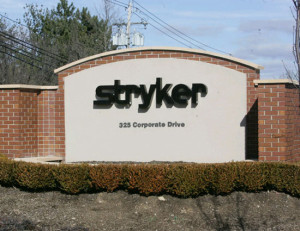Stryker Accolade Hip Plaintiffs Allege Premature Failure
 In response to premature failure rates and the risk of serious medical complications, at least five plaintiffs have recently filed Accolade hip lawsuits against Stryker Orthopaedics.
In response to premature failure rates and the risk of serious medical complications, at least five plaintiffs have recently filed Accolade hip lawsuits against Stryker Orthopaedics.
The Stryker hip lawsuits were filed in the Bergen County Superior Court in New Jersey on May 20, 2014. The plaintiffs had all undergone hip replacement surgery, during which they received an artificial joint prosthesis designed and manufactured by the defendants. It is known as the Accolade TMZF Femoral Hip Stem.
Plaintiffs allege serious medical complications
According to the defendants, the Accolade TMZF implant is comprised of a proprietary beta titanium alloy, which is intended to provide improved flexibility, elasticity, and tensile strength to mimic natural bone. The implant is sprayed with a circumferential plasma spray to improve the interface and facilitate the mechanical engagement with the bone surfaces. Although the information from the company sounds promising to hip replacement patients, many independent experts have found fault with these types of metal-on-metal implant designs.
The plaintiffs’ Stryker Accolade hip lawsuits allege that the device is defective in both design and manufacture. The product liability claims allege that there is an unreasonably dangerous risk of corrosion and fretting. These complications can reportedly lead to a high rate of premature failure – sometimes as early as within a few years of the joint replacement surgery. Like other metal-on-metal implants, the Accolade TMZF design is under fire for allegedly causing the release of metallic debris, such as cobalt and chromium particles, into the patients’ bodies. This can cause localized tissue necrosis, bone damage, and metallosis, which refers to heavy metal poisoning.
The plaintiffs claim that Stryker has known about the dangers of the materials they used for years prior to the release of the Accolade system in 2000. They demand compensation for their injuries, ongoing medical expenses, and pain and suffering.
Femoral stem subject of recall
According to the FDA, a Class 2 recall was issued for the Accolade TMZF femoral hip stem in July of 2009. The recall announcement noted that certain lots of sprayed femoral hip stems did not meet the standards for crystallinity and tensile bond strength set forth by the company. To date, the recall status for the Accolade TMZF is listed as “open.” In their lawsuits, the Accolade plaintiffs state that Stryker no longer uses the titanium alloy that comprised the Accolade model; instead, the manufacturer has developed the Accolade II femoral stem with another type of titanium alloy.
Stryker under fire for problems with other models
The Accolade hip lawsuits are certainly not the only legal problems that Stryker Orthopaedics faces. To date, over 2,000 plaintiffs have filed lawsuits against the beleaguered medical device company alleging defects in design and manufacture with regard to other models of hip implants. In 2003, Stryker introduced the Trident Ceramic Acetabular System to the market. It was intended to offer a more durable option for hip replacement patients. However, adverse event reports submitted to the FDA fairly quickly after its introduction indicated that the implant caused complications such as bone wear, fractures, premature device failure, and other problems. That hip implant was recalled in 2008 and is the subject of numerous lawsuits.
The Rejuvenate system, another metal-on-metal hip implant, was recalled in July of 2012 – not long after the implant was introduced to the market. The Stryker Rejuvenate hip replacement is comprised of cobalt chrome and titanium. It has been linked to an increased risk of infection, metallosis, pseudotumors, tissue necrosis, premature failure, the need for revision surgery, and similar complications.
- FDA, Class 2 Recall Accolade TMZF HA 132 Degree Size 0 Hip Stem, http://www.accessdata.fda.gov/scripts/cdrh/cfdocs/cfres/res.cfm?id=77624
- Stryker, Accolade TMZF, http://stryker.com/en-us/products/Orthopaedics/HipReplacement/Primary/Pressfit/AccoladePressfit/index.htm


 Resources
Resources
 Resources
Resources
